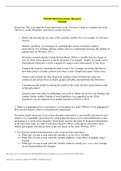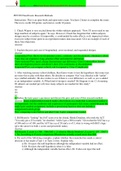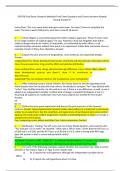Psy550 Study guides, Class notes & Summaries
Looking for the best study guides, study notes and summaries about Psy550? On this page you'll find 117 study documents about Psy550.
Page 2 out of 117 results
Sort by
PSY 550 FINAL EXAM UPDATED VERSION 2023 2024 QUESTIONS AND VERIFIED CORRECT ANSWERS ALREADY PASSED

-
PSY 550 Mid term (GRADED A) Questions and Answers | Grand Canyon University
- Exam (elaborations) • 3 pages • 2023
- Available in package deal
-
- $10.99
- + learn more
PSY550 Mid-Term Exam: Research Methods Directions: This is an open-book and open-notes exam. You have 2 hours to complete the exam. The test is worth 100 points; each item is worth 10 points. 1. Define and describe the six steps of the scientific method. Give an example of each step. Answer: Identify a problem- to investigate or a problem that can be resolved by making observations. For example, placing candies closer to a participant increases the number of candies they eat (Pivitera, ...

-
2021 Mid Term Exam (Elaborated)PSY550-Research Methods.
- Exam (elaborations) • 5 pages • 2021
- Available in package deal
-
- $5.49
- + learn more
2021 Mid Term Exam (Elaborated)PSY550-Research Methods.2021 Mid Term Exam (Elaborated)PSY550-Research Methods.2021 Mid Term Exam (Elaborated)PSY550-Research Methods.For each of the research topics listed below, indicate the type of nonexperimental approach that would be most useful and explain why. 1. Pushing ahead in line 2. Daydreaming 3. Locating the most popular painting in an art gallery 4. Studiousness in college students 5. Determining whether a particular patient has improved with psycho...

-
WK 7 DQ1 (Elaborated)PSY550-Research Methods-2021
- Exam (elaborations) • 2 pages • 2021
- Available in package deal
-
- $5.49
- + learn more
WK 7 DQ1 (Elaborated)PSY550-Research MethodsWK 7 DQ1 (Elaborated)PSY550-Research Methodsuppose that, for a t-test, your computed value for t is +3.28. The critical value of t is +2.048. Explain what this means. Do you reject the null hypothesis or not? Now suppose that you have 28 degrees of freedom and are using a two-tailed (nondirectional) test. Draw a simple figure to illustrate the relationship between the critical and the computed values of t for this result.Choose an article from the news...

-
WK 1 DQ 2 (Elaborated)PSY550-Research Methods
- Exam (elaborations) • 1 pages • 2021
- Available in package deal
-
- $5.49
- + learn more
WK 1 DQ 2 (Elaborated)PSY550-Research MethodsvWK 1 DQ 2 (Elaborated)PSY550-Research MethodsTopic 1 Discussion 2: Question: Contrast deductive and inductive reasoning and explain how they can each be used to generate a hypothesis.

-
WK 6 DQ 2 (Elaborated)PSY550-Research Methods.-2021
- Exam (elaborations) • 1 pages • 2021
- Available in package deal
-
- $5.49
- + learn more
WK 6 DQ 2 (Elaborated)PSY550-Research Methods.WK 6 DQ 2 (Elaborated)PSY550-Research Methods.Lay out the design for two between-subjects experiments: (a) an experiment involving an experimental group and a control group, and (b) a factorial design with three independent variables that have 3, 2, and 2 levels, respectively. A between-subjects experiment would include a control group and an experimental group.

-
vwk6 dq 2 (Elaborated)PSY550-Research Methods
- Exam (elaborations) • 1 pages • 2021
- Available in package deal
-
- $5.49
- + learn more
wk6 dq 2 (Elaborated)PSY550-Research Methodswk6 dq 2 (Elaborated)PSY550-Research Methodswk6 dq 2 (Elaborated)PSY550-Research MethodsSuppose that, for a t-test, your computed value for t is +3.28. The critical value of t is +2.048. Explain what this means. Do you reject the null hypothesis or not? Now suppose that you have 28 degrees of freedom and are using a two-tailed (nondirectional) test. Draw a simple figure to illustrate the relationship between the critical and the computed values of t fo...

-
WK 6 DQ1 (Elaborated)PSY550-Research Methods
- Exam (elaborations) • 1 pages • 2021
- Available in package deal
-
- $5.49
- + learn more
WK 6 DQ1 (Elaborated)PSY550-Research MethodsWK 6 DQ1 (Elaborated)PSY550-Research MethodsContrast the three types of factorial designs. Definitions A factorial design is a research design in which participants are analyzed, observed, and monitored across the combination of levels with two or more factors. The three types of factorial designs are between subjects’ design, mixed factorial design, and within-subject design (Privitera, 2019)

-
2021 Final Exam (Elaborated)PSY550-Research Methods-Practice for A+ Grading
- Exam (elaborations) • 2 pages • 2021
- Available in package deal
-
- $10.49
- + learn more
2021 Final Exam (Elaborated)PSY550-Research Methods2021 Final Exam (Elaborated)PSY550-Research Methods2021 Final Exam (Elaborated)PSY550-Research Methods.2021 Final Exam (Elaborated)PSY550-Research MethodsChuck Wagon is very excited about the within-subjects approach. “Now I’ll never need to run large numbers of subjects again,” he says. However, Chuck has forgotten that within-subjects designs may be a) useless, b) impossible, c) confounded by order effects, or d) impractical when excessi...

-
WK 8 DQ 2 (Elaborated)PSY550-Research Methods.-2021
- Exam (elaborations) • 1 pages • 2021
- Available in package deal
-
- $5.49
- + learn more
WK 8 DQ 2 (Elaborated)PSY550-Research Methods.WK 8 DQ 2 (Elaborated)PSY550-Research Methods.A researcher computed the F ratio for a four-group experiment. The computed F is 4.86. The degrees of freedom are 3 for the numerator and 16 for the denominator. 1. Is the computed value of F significant at p < .05? Explain. 2. Is it significant at p < .01? Explain

How did he do that? By selling his study resources on Stuvia. Try it yourself! Discover all about earning on Stuvia



